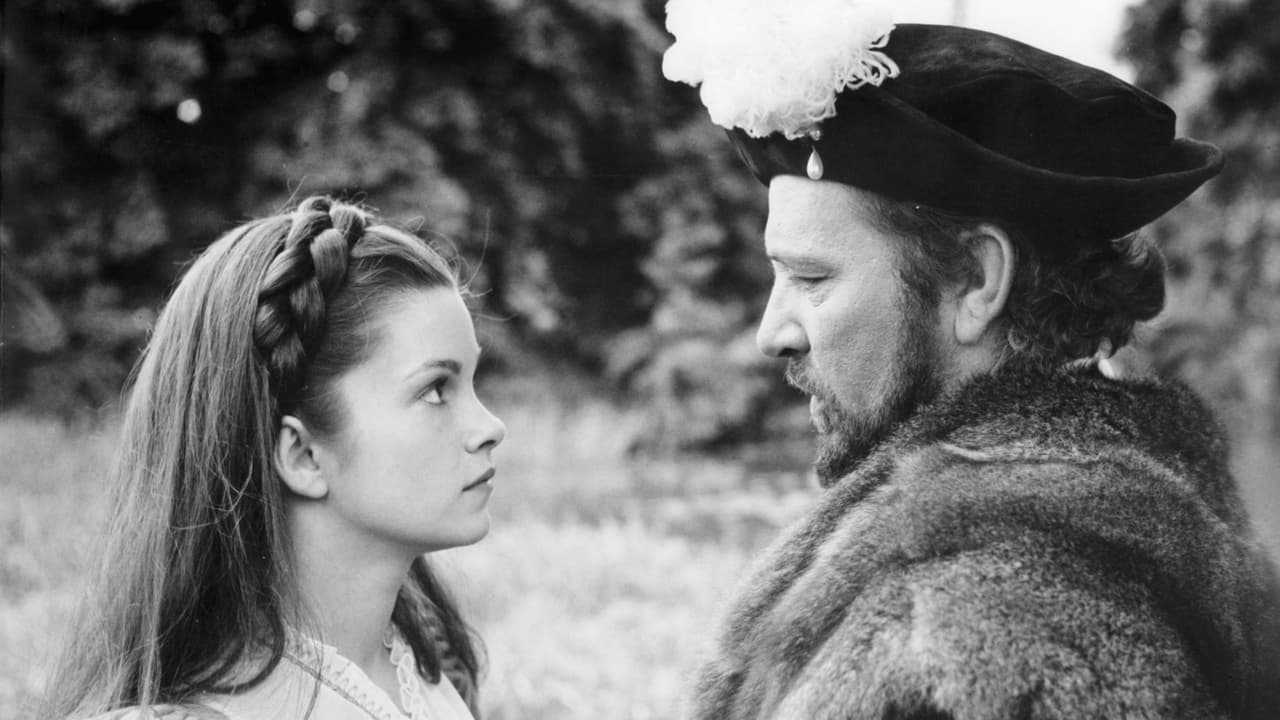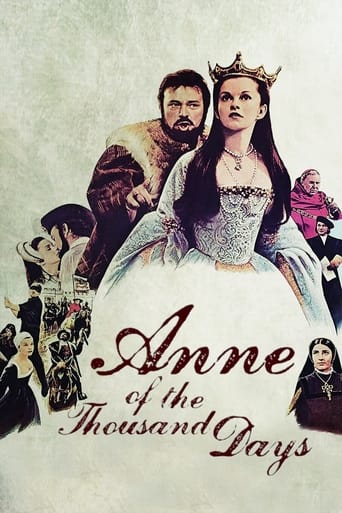SincereFinest
disgusting, overrated, pointless
Chirphymium
It's entirely possible that sending the audience out feeling lousy was intentional
BelSports
This is a coming of age storyline that you've seen in one form or another for decades. It takes a truly unique voice to make yet another one worth watching.
Lucia Ayala
It's simply great fun, a winsome film and an occasionally over-the-top luxury fantasy that never flags.
Armand
in a special manner. for acting. for accuracy. and for Bujold. a great film not about history of a king choices but about values, forms of cruelty and love, about measure and desire. it is a classic but not just for the passing time . but for delicate nuances of performance - not a really surprise from an impressive cast ( Anthony Quayle, Irene Papas, Michael Hordern or William Squaire ) - for costumes and atmosphere, for the art to be key to discover testimonies of past. in many scenes, it can be second part for The man for all seasons. in same time, it remains proof for force of characters of Richard Burton. more than a film, it is a meeting. with a page of past, with the brilliant manner to translate tension of a time, for universal message and, sure, for art to do a real remarkable film.
jc-osms
Overlong historical dramas were all the rage in the late 60's and early 70's, both on TV and film and so here we have the great Richard Burton's take on Henry VIII and the headstrong Tudor King's infatuation for the young and pretty Anne Boleyn. In truth, he's miscast, being too handsome and not fat enough for the part, but he certainly brings, yes, a kind of magisterial bearing to his character, although there was never a time in the film when I believed I was watching the real king, it always just looked like Richard Burton in a beard and ermine.It's, not unnaturally, given its subject matter and theatrical origins a very wordy piece, with plenty of speechifying by all the major characters, but the acting is of such quality that I was absorbed more than bored. Anthony Quayle as the grasping, hypocritical Cardinal Wolsey, John Corlico as the designing Thomas Cromwell and especially Michael Hordern as the shameless, self-serving father of the Boleyns all shine, while Genevieve Bujold, is very good as young girl on the make, Anne, who uses sex as a weapon to entrap Henry but who in the end dies by the same sword.Beautifully shot, with much pomp and pageantry, it occasionally drags and is spoiled by some apocryphal speeches by characters anticipating future events not yet enacted, for instance Anne's closing assertion that her daughter Elizabeth will be Queen someday and a great one - at the time, even the most ardent of mothers couldn't have foreseen this.Well-known as the story is, I still enjoyed this spiced-up historical scandal and study of power a good deal.
sddavis63
The Tudors have spawned a lot of movies over the years. Perhaps surprisingly, most of them (at least the ones I've seen, and I've seen a few) have been pretty good ones. "Anne Of The Thousand Days" is no exception to that rule. With a great cast and lavish sets, this manages to tell the story of the relationship between King Henry VIII and Anne Boleyn - apparently destined against her will to be the King's mistress, but then, at her demand, and given no choice in the matter, the instigator of both political and religious turmoil as she demands to be not the King's mistress, but the King's wife - and Queen of England - a goal stymied by the fact of the King's marriage to Catherine of Aragon.As Henry and Anne, Richard Burton and Genevieve Bujold put on excellent performances, and the supporting cast was also quite strong. Neither Henry nor Anne were truly vilified; neither were they made heroes. Henry was portrayed as a King overcome repeatedly by lust (the cycle emphasized near the end of the movie with the appearance of Jane Seymour at court while Anne watched at a dinner very reminiscent of the dinner at which Anne appeared at court while Catherine watched.) Henry will manipulate and threaten and do whatever it takes to satisfy his lust. Yet, one gets the impression that - while consumed by lust - Henry does have a sincere concern about the need for a male heir and a belief that England won't allow itself to be ruled by a Queen. He's also clearly portrayed as concerned by his split with the Church, although at the same time one sees that he believes his prerogatives as King take priority over the concerns of the Church or even of God, summed up by his comment that "when the King prays, God answers." Anne on the other hand is a figure of some sympathy. In this movie at least she didn't ask to get mixed up in royal politics; she was the unwilling attention of Henry's lust. Yet, once her destiny was sealed, she also is clearly manipulative, grasping after what she wants, determined to get as much as she can from the King. The politics of the court are well portrayed, and most of what we see is accurate to the historical record, although the movie chooses to end on an obviously anachronistic note, with looks ahead to the glorious coming reign of Anne's daughter, who would defy her father's belief that a Queen couldn't rule England by becoming the magnificent figure of Queen Elizabeth I. This is a worthy piece of the Tudor movie collection. (7/10)
Igenlode Wordsmith
Richard Burton and Genevieve Bujold both give bravura performances here, but I was particularly struck by the quality of the supporting cast in what could easily have been a film totally dominated by its two stars. John Colicos stands out as a highly intelligent Thomas Cromwell, jumping ship from the old master to the new as Wolsey's favour falters, scheming and utterly ruthless and yet human enough to betray a moment of shaken relief after successfully manipulating his monarch. Anthony Quale as Cardinal Wolsey, who makes the mistake of holding more power than the King -- and of alienating the King's mistress -- is also excellent, as is William Squire in a small part as Thomas More. Irene Papas plays a fine gaunt Spanish Queen (although ironically, the real Catherine of Aragon was praised in her youth for her fair hair, dainty stature and generally un-Spanish looks!) and Michael Hordern does well as the pandering Thomas Boleyn, who procures both his daughters for the King's pleasure. Gary Bond as the unfortunate musician Mark Smeaton (does he really sing those countertenor-style ballads himself? I see that he played the lead in "Joseph & the Technicolor Dreamcoat") creates a character out of what could have been simply a pretty-boy role, and a number of other actors lend depth to brief appearances in parts such as Lady Kingston (the wife of Anne's jailer).My main issue with the film would be the clunky dose of hindsight administered in the closing voice-over (a lingering shot of the toddling Princess Elizabeth), which undermines the impact of the ending. Anne's finally falling for Henry also seemed to come somewhat out of nowhere: he is no more likable at this point than earlier, when she rejects him scornfully, and there has been no sense of preceding love/hate tension between them; what I got was mainly scorn. One just has to take this development as read for the sake of the plot.Otherwise, a powerful and impressive production that canters through some complicated history without becoming dull.

